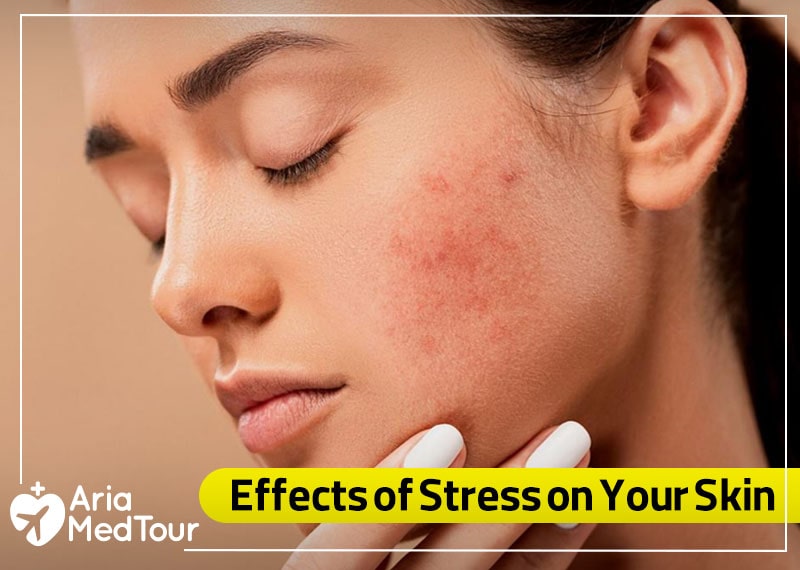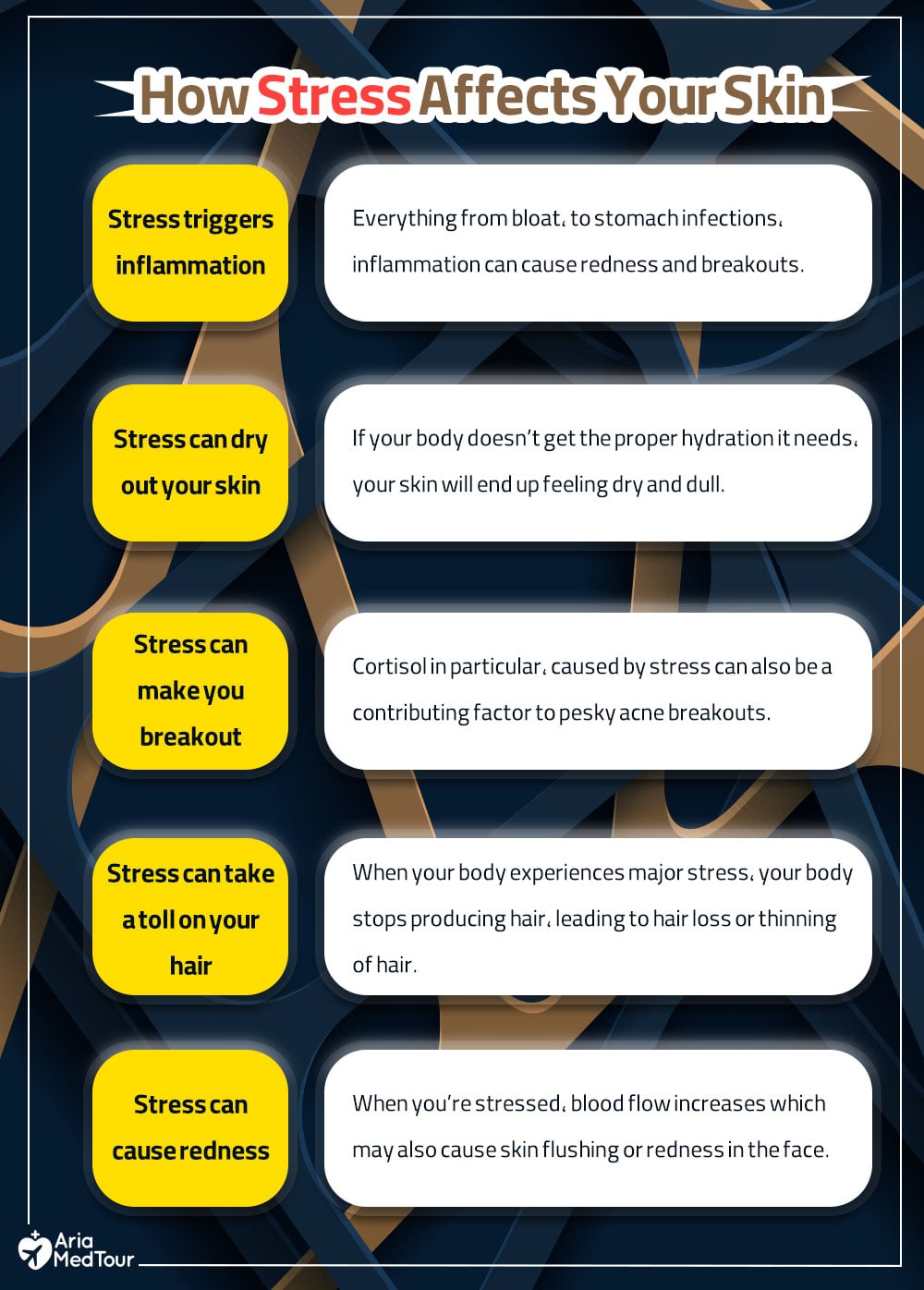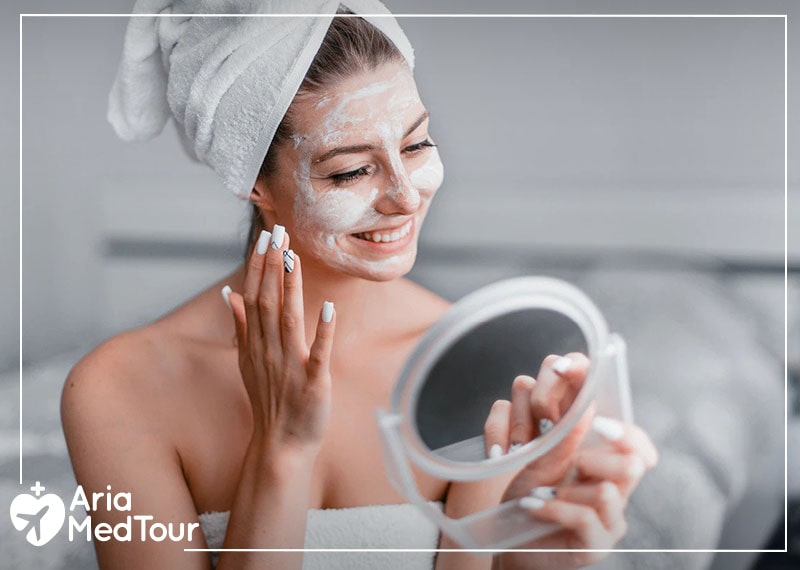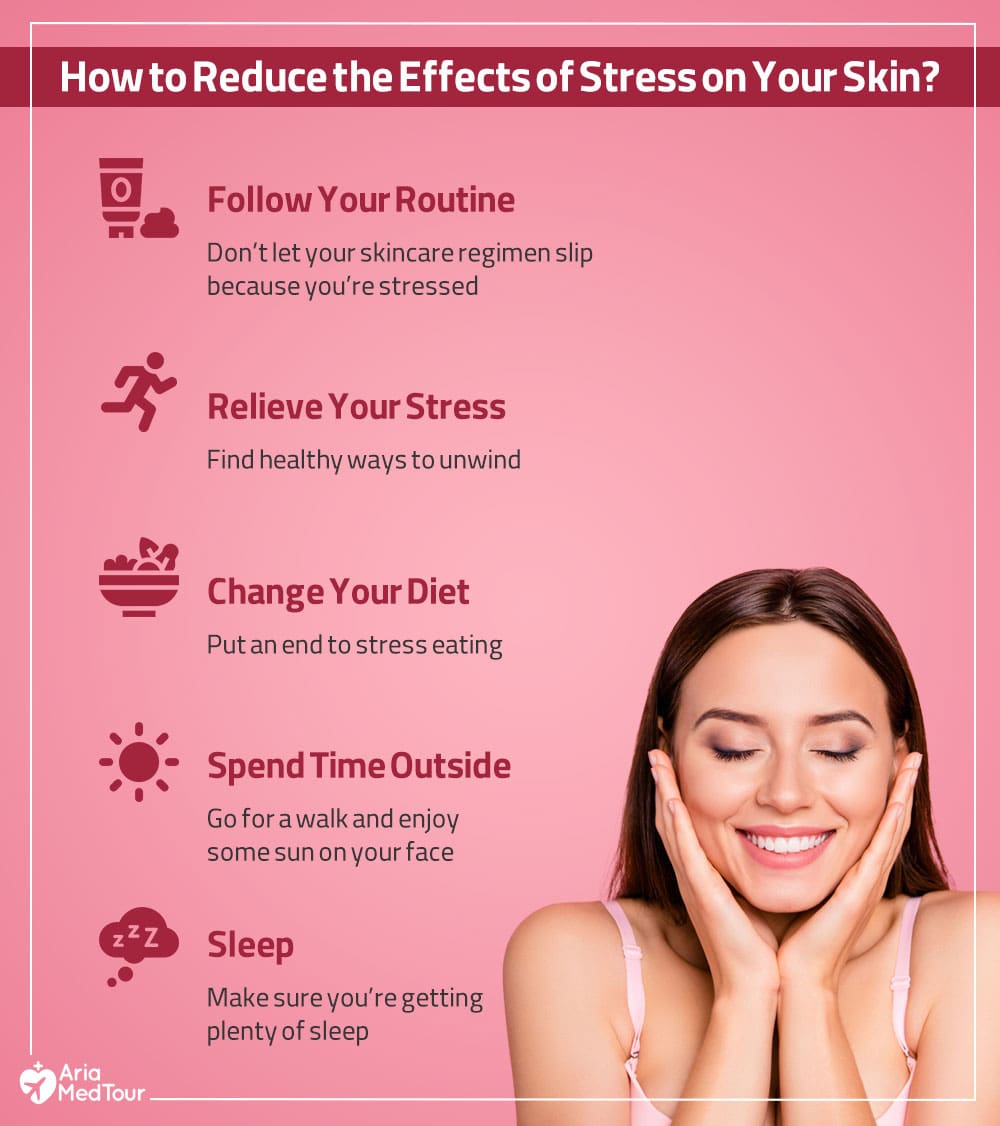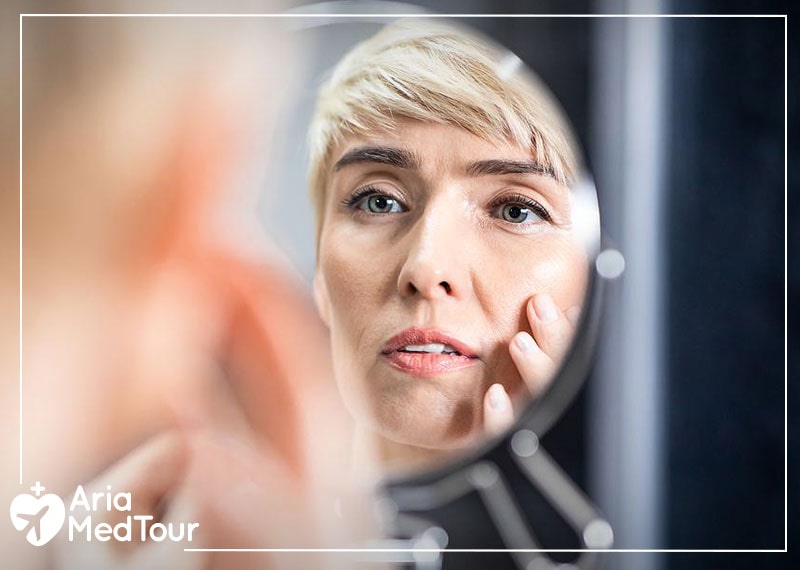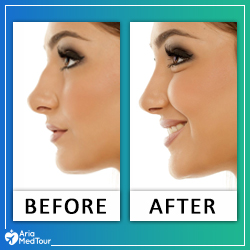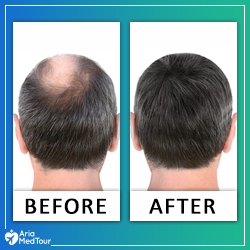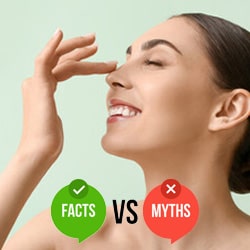If you are suffering from skin problems, it is important to learn more about the effects of stress on your skin. The human body reacts to various forms of stress by producing stress hormones. This can have a number of negative effects on the skin. For example, if you are experiencing depression, your skin will become dry and cracked. It may also develop a rash or eczema flare-ups. Furthermore, if you suffer from chronic or recurring acne, your stress levels may cause the symptoms to appear more frequently.
If you have a difficult job, a stressful lifestyle, or a bad relationship, it will affect your skin. When you are stressed, your immune system releases stress hormones that cause inflammation. This internal inflammatory response will manifest on the outside, and your skin begins to show the results. The effects of stress on your skin can be detrimental to your health in a number of ways. It can lead to high blood pressure, fatigue, and headaches.
Although you might think that your skin is immune to stress, this is not the case. Several diseases and conditions can be exacerbated by chronic stress. For instance, chronic stress can lead to a weakened immune system and more prone to infection. It can also lead to skin conditions like psoriasis, acne, and dark circles under the eyes. All of these conditions can cause your skin to appear dry and irritated.
How can stress affect my skin?
According to scientific studies, the hormones released by stress can cause your skin to react in a negative way. Your immune system can also be affected by stress. The immune response caused by stress can trigger external symptoms of inflammatory diseases. This can also lead to more sensitive skin. Psoriasis, atopic dermatitis, and acne can become worse as a result of excessive stress.
How can stress affect your skin?
When your skin is under stress, it reacts in various ways. It may produce a breakout, or it may become irritated and inflamed. Even healthy skin can be damaged by psychological conditions. It is best to find ways to relieve your stress so your skin can be healthy again. There are many methods for doing this, including taking mini-vacations, exercising daily, meditating, and walking in nature.
The first step in treating your stress-related skin condition is to reduce the amount of stress that you experience. In addition to reducing your stress level, you should also try to find methods to relieve yourself of everyday tension. A mini-vacation, counseling sessions, or even practicing yoga or meditation can help you deal with your worries. You can also try walking in the nature to get some fresh air. These activities will give you a break from the everyday grind and help you deal with your stresses.
One way to manage your stress is to take mini-vacations and exercise regularly. You can also learn yoga or meditation to help you relax and cope with your worries.
However, it is best to consult a medical professional for help with this. They specialize in treating patients with anxiety disorders and provide them with strategies to cope with these conditions. And, if you’re looking to treat your stress, you can always visit your dermatologist regularly.
Research has shown that chronic stress is harmful to the skin.
Studies have shown that chronic stress can affect your skin. While it may affect your relationships and your overall wellbeing, stress can also make it difficult to treat any skin condition you may already have. Your skin will appear dull and oily and it can look aged and stressed. Ultimately, this stress is bad for you. Fortunately, it’s not too late to start addressing the effects of stress on your skin.
Research has shown that chronic stress is harmful to the skin. It can lead to dryness, rosacea, and dark circles under the eyes. Moreover, it can affect your nails, hair, and other body parts. So, if you are stressed, you need to pay attention to your skin. In the long run, it will thank you for it. It will also protect your body. This is why it is so important to keep your stress levels low.
How to Prevent Skin Problems Caused by Stress
Skin is the body’s largest organ, and it can be affected by stress. The stress response can alter skin cells and lead to acne and other issues. The sympathetic nervous system releases cortisol and adrenaline in the body, which can exacerbate the condition. A dermatologist will be able to prescribe solutions to prevent skin problems caused by stressful situations. In addition to topical treatments, the dermatologist will offer advice on how to manage stress.
One of the most common solutions for stress-related skin conditions is using skin-care products. While these products are helpful, most are not designed for people with stressed-out skin. As a result, they can aggravate already-existing conditions and irritate the problem. To help treat the problem, it is recommended to avoid ingredients that degrade the skin barrier. These ingredients are drying and can exacerbate the problem.
One of the most common solutions for stress-related skin conditions is using skin-care products.
Another effective remedy is a clarifying cleanser. This product can help reduce the appearance of acne and blemishes. Avoid over-exfoliating your skin, which can lead to an excess production of oil. Also, spot treatments for acne are available. Lastly, you should apply hyaluronic acid serum on a regular basis. This serum is less comedogenic and can be applied every day to help improve the condition of your skin.
Although skin care products can improve the appearance of your skin, they are not the answer to skin problems caused by stress. Most products are created for consumers with healthy skin barrier. Exposing a broken barrier to active ingredients can worsen the condition. In addition, many of these products contain alcohol, which is drying and depletes the normal healthy barrier function. As a result, these are not the right products for people with stressed skin.
Moreover, skin-care products cannot solve the problem of stress-induced rashes. While they are designed for people with healthy skin, they do not work well for people with stressed skin. For example, a typical cream that can cure acne caused by stress does not contain alcohol, which is a drying substance. Likewise, it may not work for people with stressed skin. The most effective solution for stress-induced rashes is to avoid them altogether.
Despite the fact that most of these rashes are not life-threatening, it is still important to avoid them. The first thing you should do is to avoid stressful situations. Then, you should practice a healthy routine. Exercise will release feel-good hormones and improve your mood. Try to limit the intake of processed foods and sugar-laden products. Additionally, getting enough sleep will improve your energy levels and cognition.
How to Prevent Skin Problems Caused by Stress?
Stress can exacerbate skin problems. For instance, it can lead to fever blisters and rashes. Furthermore, the stressors can also interfere with your daily routine and cause you to skip your daily skin care routine. Therefore, it’s crucial to follow your skin care regime. The more you practice it, the more your skin will look beautiful. For the best results, it is important to follow a regimen that includes moisturizers and sunscreen.
The most common symptoms of stress are acne and oily skin. You can prevent acne by using a good cleanser with a pH balance. Over exfoliation can cause overproduction of oil and can lead to acne. Using spot treatments can also help. Keeping your skin moisturized can help prevent the breakouts. Finally, you should adopt a daily ritual to reduce your stress. Taking time for yourself is important.
While the skin care routine is an important aspect of skin health, the best way to prevent skin problems caused by stress is to avoid the triggers that cause it. The main cause of stress is overproduction of oil in the skin. The most common treatments for acne include using a clarifying cleanser and reducing your makeup. If your skin is oily, spot treatments will help you minimize the appearance of blemishes.
How to manage my stress to keep my skin healthy?
If you have stress-related skin problems, you’re probably wondering how to manage your stress to keep my skin healthy. You can’t avoid stressful situations completely, but you should try to reduce your exposure to them. If you can’t avoid all stressful situations, plan short, less stressful events. For instance, if you need to have a visit from Aunt Suzy, you should ask her to come to your house. However, if you’re going to have a long, stressful event, plan it ahead.
As the body’s largest organ, the skin can be particularly affected by stress. As a result, when we’re under a lot of pressure, our skin is often the last to be taken care of. Stress can impact skin cells and lead to acne outbreaks and skin flare-ups. In addition to having a negative effect on your health, it can even make your skin look dull and unhealthy.
How to manage your stress to keep your skin healthy?
Although it’s impossible to avoid stressful situations, a healthy approach to managing them can help you address your skin’s health and appearance. By focusing on reducing your stress levels, you can start incorporating more healthy habits into your life. Once you identify the triggers of your stress, you can create new, healthy lifestyle and skincare habits. The first step is to figure out what causes your stress. This will help you brainstorm solutions to manage them effectively.
Conclusion
The stress you experience can cause your skin to break out or become oily. While acute stress can be beneficial, like when you’re in a stressful situation, chronic stress can have an adverse effect on your skin. The primary reason for this connection is the overproduction of cortisol, the main hormone responsible for stress. This is why you should keep stress away from your life to prevent skin problems among the many other consequences of stress.

